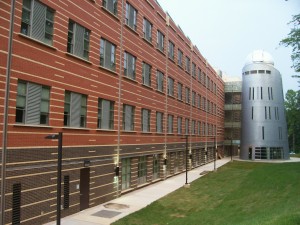
Our meetings on the second Sunday of the Month, The events are normally held evening at 7:00 pm in Research Hall Room 163 on the campus of George Mason University.
Our meetings web page, has directions and additional details.
We look forward to seeing you on Sunday evenings!
The Leonids is an average shower, producing up to 15 meteors per hour at its peak. This shower is unique in that it has a cyclonic peak about every 33 years where hundreds of meteors per hour can be seen. That last of these occurred in 2001. The Leonids is produced by dust grains left behind by comet Tempel-Tuttle, which was discovered in 1865. The shower runs annually from November 6-30. It peaks this year on the night of the 17th and morning of the 18th. The nearly new moon will not be a problem this year. Skies should be dark enough for what should be good show. Best viewing will be from a dark location after midnight. Meteors will radiate from the constellation Leo, but can appear anywhere in the sky.
The public night scheduled for 18 November is canceled. Although the Clear Sky Chart[1] currently says only 50% of the sky will be covered by clouds, all of the other forecasts predict “cloudy”[2] or “mostly cloudy”[3][4] with a chance of precipitation. DC television weather-guessers all agree it will be mostly cloudy tomorrow evening with differing opinions on the timing and amount of precipitation.
Hoping for clear skies for future public nights,
R. J. ‘Tree’ Greenwood
Crockett Park Site Coordinator
[1] http://www.cleardarksky.com/c/CrckttPrkVAkey.html
[2] https://www.accuweather.com/en/us/midland-va/22728/hourly-weather-forecast/2111280?hour=40
[3] https://weather.com/weather/hourbyhour/l/22728:4:US
[4] https://www.wunderground.com/hourly/us/va/midland/date/2017-11-18?cm_ven=localwx_hour
Please read the C.M. Crockett Page for park details.
See front page of NOVAC Site for changes to event.
More information about Great Meadow including directions and parking visit the Great Meadow Site page.
see http://cantonbecker.com/retrograde for details…
The Geminids is the king of the meteor showers. It is considered by many to be the best shower in the heavens, producing up to 120 multicolored meteors per hour at its peak. It is produced by debris left behind by an asteroid known as 3200 Phaethon, which was discovered in 1982. The shower runs annually from December 7-17. It peaks this year on the night of the 13th and morning of the 14th. The waning crescent moon will be no match for the Geminids this year. The skies should still be dark enough for an excellent show. Best viewing will be from a dark location after midnight. Meteors will radiate from the constellation Gemini, but can appear anywhere in the sky.

